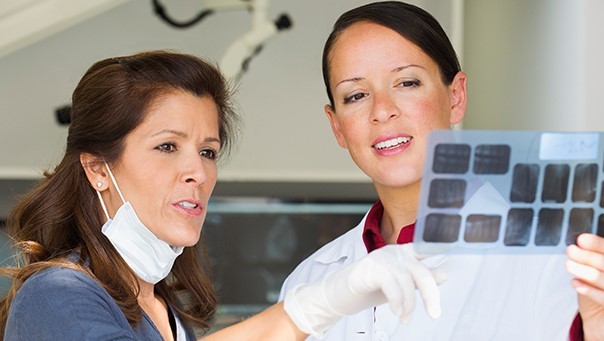-
-

BRUSHING & FLOSSING
How to BrushWhat Is the Right Way to Brush?
Proper brushing takes at least two minutes — that's right, 120 seconds!...

BRUSHING & FLOSSING
How To FlossWhat is the Right Way to Floss?
Proper flossing removes plaque and food particles in places where a toothbrush cannot easily reach... -
Science & Innovation
- Home
- Oral Health
- What is the Recovery Time after Wisdom Teeth Removal?


The pain, swelling and discomfort that follows wisdom tooth extraction is a normal part of the healing process. How long is the recovery time after wisdom tooth removal? When will you be back to chewing crunchy carrots and apples with ease?
Getting Your Wisdom Teeth Removed
The wisdom teeth, also known as the third molars, are the final set of molars to erupt. Not everyone keeps these teeth, nor are they necessary for having a healthy, beautiful smile. In fact, they can cause harm if they do not come in properly. When these molars come in, usually between the ages of 16 and 20, there may not be enough room left for them to erupt. As a result, they can emerge at an angle, they may crowd the mouth and sometimes they don't fully emerge. This can lead to future oral health problems like infections and pain.
If necessary, a dentist or oral surgeon can remove the wisdom teeth in a single outpatient procedure or they can be removed at more than one appointment - depending on your circumstances. While general anaesthesia or local anaesthesia, with or without sedation, are options used to make wisdom teeth removal a more comfortable procedure, pain and discomfort can be a part of the healing process, especially after the anaesthesia wears off. After your wisdom teeth are extracted, recovery time begins.
Taking Care of Yourself After Surgery
After getting your wisdom teeth removed, you are likely to experience pain and swelling. There may also be some bleeding. If bleeding occurs bite down on a clean cotton pad for 10 minutes and if this does not stop the bleeding, contact your practitioner. While your mouth heals, you have to be careful not to dislodge the blood clot or harm your healing gums. You should not consume hard foods, alcohol, coffee, soft drinks or hot beverages in the first day following your procedure. You shouldn't even brush your teeth, especially around the extraction area for the first day of recovery.
There are plenty of things you can do to make the recovery time easier. Plan on taking it easy for a few days; you can resume your normal activities after the first day in most cases, but for about a week you don't want to do anything that could dislodge the blood clot from where your teeth were removed. For the pain, ask your dentist or pharmacist for advice. To help with the swelling, place an ice pack over your jaw. The cold helps to reduce the inflammation and ease any discomfort.
Your dentist or oral surgeon should instruct you on how to take care of your mouth for the recovery period. You may be told to avoid brushing, spitting, flossing and rinsing for 24 hours. After that, you can gently brush your teeth. Rinse your mouth with warm salt water frequently to help keep it clean and help prevent an infection. Your practitioner may also suggest the use of an antibacterial mouthwash. You may want to eat a soft-food diet for the first day or more, and then slowly move to semi-soft foods when you are ready. Stock up on fruit puree, yoghurt, cottage cheese and other soft foods before the procedure.
The recovery period can take several days and in some cases there may still be swelling and discomfort for a week or more. Use ice packs, enjoy soft foods and keep the healing area clean with simple salt water. If you notice any unusual symptoms like pus discharge, severe pain or a fever, call your oral surgeon right away. While complications such as an infection are rare, they are possible.
Related Articles

If you have been experiencing problems with a tooth, you may wonder, "Do I need a root canal filling?" Root canal fillings, also known as endodontic therapy, are performed when the nerve or pulp of the tooth becomes infected

When people are told that they need a root canal therapy, they often worry that it's going to be painful.

The goal of the root canal therapy is to save a tooth that is severely infected. As Dental Health Services Victoria puts it, a dentist performs the procedure to replace damaged or infected pulp in the tooth's root canal with a root filling.
This article is intended to promote understanding of and knowledge about general oral health topics. It is not intended to be a substitute for professional advice, diagnosis or treatment. Always seek the advice of your dentist or other qualified healthcare provider with any questions you may have regarding a medical condition or treatment.
Related Products

Helping dental professionals
More professionals across the world trust Colgate. Find resources, products, and information to give your patients a healthier future








